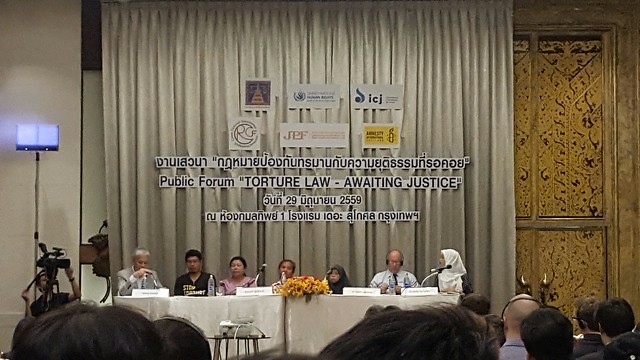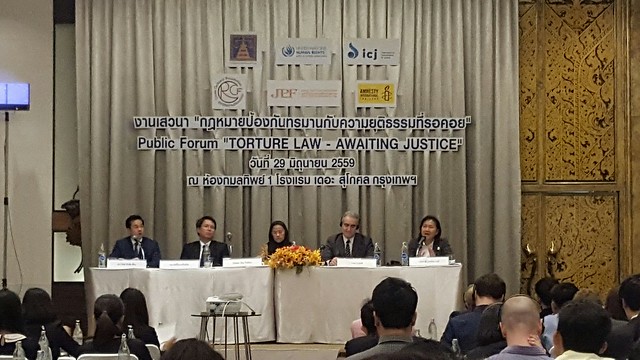Thailand has a grim and poor record of torture and enforced disappearances, which even in the last 10-15 years has barely improved, regardless of the international treaties and agreements it has signed onto. Experts, though, believe that improvements are coming, hopefully sooner than later.
On 29 June 2016, a public forum on Torture Law occurred, which featured two panels of many of experts from various fields, as well as three mothers who son’s have been tortured by authorities. All panelists were mostly content with the earnest efforts during the process to establish laws in Thailand against Torture and Forced Disappearance.
The event started with heart wrenching stories of mothers who must bear the burden of knowing their sons were allegedly beaten, tortured or killed by authority powers, in these contexts, mostly in the south of Thailand. Ismael Teh, a young man from the deep south who helped establish Human Rights Watch Pattani, also recounted his experience of being tortured when he was younger during his time as a student activist. While being held for longer than legally allowed under the existing martial law in the South of Thailand, he was stripped, tied up and shocked while being questioned by authorities about the southern insurgency which he had no affiliation with.
When cases like these were raised in hopes of finding justice for direct and indirect victims, collusive offers of payments for damages would offered by the authorities, but would be typically followed by fear and intimidation for accepting the money. There is also a prevalence of immense intimidation by authorities for those who wish to pursue legal cases for being torture victims, which, in addition to not having a law that makes torture practices illegal, leaves no wonder why perpetrators are never held accountable for their actions.
Shady politics like this this has created a fearful atmosphere for human rights defenders. Somchai Homlaor, a panelist and human rights lawyer, made it clear speaking about his own experience of advocating for the human rights and stopping of torture of refugees. By bringing attention to this issues, the government became defensive and blamed him for creating a scandal. He soon indicted by the government, and forced to flee to Hong Kong and the United States for safety for a number of years.
These issues are rooted in the facts that many of the perpetrators of torture are done by people in authority positions, or are at least occur under the awareness of people in positions of power.
Dr. David Engstorms, a social working on rehabilitation of violence survivors, made a clear emphasis on the necessity to provide rehabilitative care for torture survivors as it is part of the justice process. He equated cases of torture to those of sexual assault, violence, and child abuse. There are many similarities psychological damages found in victims of crimes like these such as Post Traumatic Stress Disorder, depression, anxiety and more, which can lead to future issues such as radicalization.
Furthermore, in cases like these, the violent actor(s) try to silence the victim through intimidation, and justification. In cases of the sexual assault it is because the victims drank too much, or dressed provocatively, and in torture, it is because it was a necessary means to protect national security. This silences victims, which as Dr. Engstorms said, perpetuated more violence. Practices like these are put the burden of proof on the victim which makes them ultimately guilty until proven innocent.

The first Panel discussing the state of torture and enforce disappearance in Thailand
There are many articles in this bill which have satisfied the panelists. Sam Zarifi, The International Commission of Jurist’s Regional Director for Asia and the Pacific, said that this is a “good draft,” and that “as a lawyer, passing the law is most important, but as an activist, it is only the first step.”
This bill honestly reflects international standards for these rights against torture and forced disappearance because it will be established that these rights are derogable. What this means is that under absolutely no circumstance is it allowed to remove these rights from a person, even if they are a proven terrorist, or it is a time of war.
Pokpong Srisanit, an Associate Professor at the Thammasat University Faculty of Law, made the point that the new definition of “victim,” which now includes the victim as well as their families, or other people affected by the torture or forced disappearance. This is especially important in cases of forced disappearance because it would allow families of the person who disappeared to be able to take legal action that factors the seriousness of the crime, whereas currently, cases can only fall under ‘missing persons’ since Thailand lacks the legal framework.

The second panel discussing the legal intracacies of the Bill against Torture and Forced Disappearance
A current point of contention and resistance to this bill, as multiple panelists mentioned, is Article 9, which not only holds authorities who commit torture accountable, but also any commanders who are aware of the occurrences of these practices and do not stop them. Article 6 provides a similar function of accountability of commanders as well, but in the context of forced disappearance. Since this law increases the accountability of authorities, especially those in higher positions, there is much rejection from authority personnel.
Article was 36, which would protect families or victims who pursue legal action against the government was highly commended. A current form of intimidation by the government is to countersue families and victims who bring up cases which pressures them to keep quiet.
Under article 36, so long as the case is brought forth in good faith, victims pursuing legal cases against torture and forced disappearance will not be prosecuted. This article could also protect forensic doctors who in the past have been scared of retribution for truthfully discussing the results of their analysis of victims in cases involving torture, which could also support the justice process.
Angkhana Neelapaijit, the National Human Rights Commissioner of Thailand, discussed how major concern for her is seeing this bill pass, and be ratified into a law. These concerns were echoed by Sam who stated that accountability is key to making this bill pass, but with articles 44, 47, and 48 of the current interim constitution, accountability is nearly impossible. The bill has passed its first reading.
Related Article - http://prachatai.org/english/node/4693

